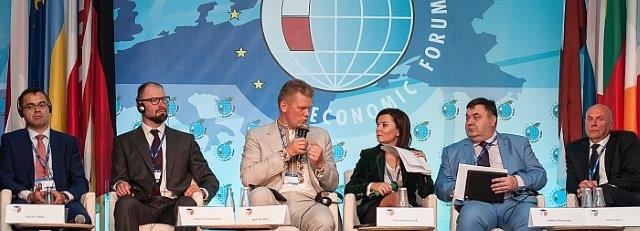
Both US and Ukrainian experts believe that an offensive from Russia is still possible. Zorian Shkiryak, Advisor to the Minister of the Interior said this on the air of the Ukrainian TV channel, 112 Ukraine.
"There are no terrorist gangs in Donetsk and Luhansk regions beyond the control of Putin. There is just, to put it simply, some misunderstandings amongst themselves, wars between gangs, but this is a struggle for spheres of influence and all of them are controlled by Putin. Unfortunately, today we have a situation where you need to state openly that the next phase of the possible wide-scale confrontation is real," he said.
Shkiryak also added that Ukraine will not allow the Crimean scenario, and all those who organized the "elections" in the [so-called] “Donetsk and Luhansk People’s Republics" will be punished.
As was earlier reported by UNIAN and TSN, Phillip Karber, professor of military strategy, co-author of a report on the development of the military situation in Donbas, said at the 7th Europe-Ukraine Forum
in October 2014 that a Russian invasion of Ukraine is possible in spring 2015.

“There is not even a 25 percent chance to maintain a truce in eastern Ukraine”, says an American expert. Phillip Karber was an advisor on military strategy matters to the Secretary of Defense and the Chief of the Joint Chiefs of Staff of the United States, as well as the former British Prime Minister Margaret Thatcher and the Secretary General of NATO.
“Russian President Vladimir Putin seems too determined in the quest to conquer at least the eastern part of Ukraine to refrain from implementing his plan – says the expert.
Currently Karber almost permanently resides in Donbas and Kyiv, while remaining in close contact with representatives of the political and military authorities of Ukraine. He also advises the field units commanders, including volunteer battalions, that see the heaviest fighting with the pro-Russian separatists and Russian troops supporting them.
Prof. Karber believes, that in the near future, there is absolutely no possibility for Ukraine to recover either Crimea (annexed by Russia despite the objections made by the Western countries), or other territories in the East of the country, over which the authorities in Kyiv have lost control. Moreover, even the present armistice (violated on a daily basis) is in danger, and if it falls apart, it will surely result in further territorial losses on the Ukrainian side, especially bearing in mind Russia’s overwhelming military predominance.
The Organization for Security and Cooperation in Europe (OSCE according to agreements in Minsk should supervise the ceasefire in Ukraine) is “too weak, too blind and does not have sufficient resources to effectively supervise the ceasefire,” Mr Karber, head of the American conservative think tank Potomac Foundation and a lecturer at Georgetown University, said on www.PolskieRadio.pl.
Upholding the truce is even more difficult because we are dealing with a so-called “hybrid war”, that combines conventional military actions with unconventional ones (guerrillas, terrorist attacks) and cyber attacks, which makes the conflict and conflicting sides less perceptible and more likely to get out of control.
According to the expert on strategies and war games, the chances of maintaining a fragile truce may, however, significantly increase, despite serious obstacles, if the Western countries strongly support Ukraine. They will increase to 50-60 per cent., if the Ukrainians are equipped with reconnaissance systems and electronic warfare, Karber highlighted.
In his opinion, the West should, inter alia, provide digital communications systems and Humvee light armored cars to help the Ukrainian military. That would strengthen the belief of Ukrainians that they are able to effectively uphold the truce and resist attempts at violations of the truce by Russian forces and separatists under their control.
An even greater chance of long-term truce, according to Prof. Kraber, would be achieved by financial and numerical strengthening of the OSCE mission. In particular, its members do not feel confident after the incidents of OSCE staff members being kidnapped by pro-Russian separatists and treating them like hostages. The detainees were also tortured.
Another factor increasing ("up to 84 percent") the likelihood of continuation of the ceasefire would be effective Western economic assistance to Ukraine, a kind of "Marshall Plan," insists Karber.
Without the strong support of the United States and the European Union, Ukraine is threatened with economic collapse.
“The mistake of the West was excluding any military response to Russia's actions towards Ukraine. If Putin, who now for tactical purposes mitigates his position, sees that the West wobbles again, lacks determination to maintain the sanctions imposed on Russia, then he will go further and Russian troops could reach Transnistria (separatist Russian-controlled enclave in Moldova) by traversing Ukrainian territory,” emphasizes prof. Karber.
According to Karber, Poland and other democratic countries should support Ukraine to defend itself and stop enemy attack. “Rhetoric is not enough, it is significant to clearly signal willingness in manner of tit-for-tat strategy,” underlined Karber at the 7th Europe-Ukraine Forum (2014).
Otherwise, he said, the West will not succeed in fighting the extremely dangerous tactics of political terrorism that Putin’s Russia employs close to the borders of the EU and NATO. Prof. Phillip Karber was in Warsaw on the initiative of the Foundation Institute for Eastern Studies
, the organizer of the annually held Economic Forum in Krynica.
Compiled and processed by Dr. Vitalii Usenko, MD, MBA, expert of the Center of Military-Political Studies in the sphere of psychology of communications and by Dmytro Usenko, student at Rotman School of Management, University of Toronto

